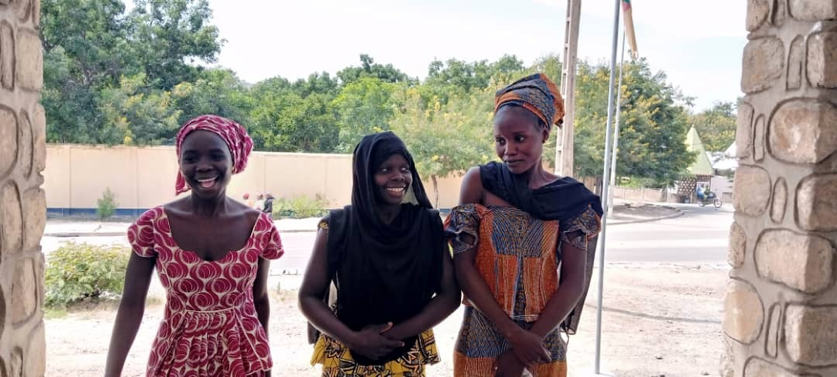Cameroonian Juveniles Released After Almost Six Years in Prison
On October 23, 2020, three juveniles who were facing a lengthy prison sentence and had previously been sentenced to death by a military tribunal, were acquitted and released by the Mokolo Court. It was the first time that people convicted in a terrorist case were acquitted at retrial in Cameroon.
After eight delays, the Mokolo Court pronounced its decision in Marie Dawandala’s, Damaris Doukouya’s, and Martha Weteya’s cases. The women had been arrested when they were seventeen years old and have been in custody for almost six years. Marie’s son and Damaris’s daughter were held in custody with them, and Marie and Damaris raised them in life-threatening conditions. The three women were sentenced to death by a military tribunal after being arrested while fleeing Boko Haram violence. On appeal, the women’s death sentences were vacated because military tribunals cannot hear cases involving minors in Cameroon. Still, the prosecutor decided to have a new trial and charged the women before a civilian court with espionage, conspiracy to commit insurrection, and membership in an armed gang.
Cameroonian lawyer Nestor Toko, President of the Network of Cameroonian Lawyers Against the Death Penalty, represented the women after meeting them in 2019 when he traveled to Maroua. Convinced that they had been wrongly accused and appalled at their account of their arrest and trial, he agreed to represent them pro bono. Nestor asked the Cornell Center on the Death Penalty Worldwide to assist in their defense, and the Center recruited the American law firm Debevoise & Plimpton to provide critical legal support and resources. Later, Nestor obtained the assistance two other Cameroonian lawyers who joined the case, Honorine Bahane Dourwe and Moussa Ganava.
In July 2020, after the judge’s decision regarding the case had been postponed six times, the Cornell Center on the Death Penalty Worldwide and ECPM (Ensemble Contre la Peine de Mort – “Group Against the Death Penalty”) organized a media campaign to raise awareness about the case and disseminated a press release, co-signed by 33 other human rights organizations, urging the Cameroonian authorities to ensure that the women receive a fair and speedy judgment. The judge in charge of the trial was replaced, and two months later the new judge acquitted the three women.
Marie’s, Damaris’s, and Martha’s acquittals are a transformative moment for persons arbitrarily convicted of terrorism in Cameroon and for the fight against the death penalty. This is the first time that a defendant convicted of terrorism in Cameroon was acquitted at retrial. We hope this case paves the way for the acquittal of other wrongfully convicted people in Cameroon and sparks a dialogue about fair trial rights and the continued used of the death penalty.
To read more about the three juveniles’ cases:
https://deathpenaltyworldwide.org/cameroon-targeting-girls-fleeing-terrorist-violence/
